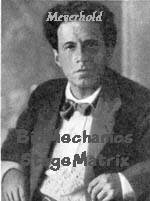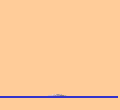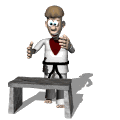Well, this is another BM directory (I call it BM+); I need it in order not to mess the old BioMX @ filmplus.org. Besides, I want to keep two levels of complexity separately. Like Acting I and Acting II. BTW, I teach biomechanics mostly in Acting II classes (THR221 Intermediate Acting).
I will be bringing together Stanislavsky and Meyerhold, since I use both and since I would like to organize them as the ONE System (in Acting ONE I call it "BioMethod"). Did you read the title page?
Probably better, if you start with the old BM directory, or even with act.vtheatre.net, Fundamentals of Acting. Or maybe with the first original page, which started everything: ACT... Wait! Perhaps, Brecht page in script.vtheatre.net is a good beginning...
One way or another we need to introduce a few non-Aristotelian principles. Remember "episodic structure" in epic theatre? Should we now talk about "episodic acting"? What about acting for the camera?
In his book "Five Approaches to Acting" David Kaplan gives the definition of The Basics of an Episode:
"The King died and then the Queen died" is a story.
"The King died and then the Queen died of grief" is a plot.
[ ... ]
What an episodically structured performance does is act out a story, or sequence of events, rather than attempt to perform a plot linked together by cause and effect. In theory, each event in a story can be understood separately from the sequence. (62)
[ Spring 2008 ]
Well, I rather call the cause-effect sequience a STORY, but you got the point: "Performed onstage -- no matter why -- an event becomes an episode"
Maybe your experience clocking TV remote could provide a better image of "episode" -- relative independence from the rest of the whole. Or should we say that this whole is constructed differently?
Each episode have a central gesture: look at the picture!
[ Actors, take one character from the pix (old paintings) and think how did we arrived to this position? Directors, think about the group composition. ]
[ ]
 BioMechanics (BM) poll, Oct. 1, 2004. 135 votes.
Biomx is important because...
BioMechanics (BM) poll, Oct. 1, 2004. 135 votes.
Biomx is important because...
Method Acting is limited 34 (25%)
We need physical theatre 35 (25%)
Method is not working 1 (0%)
actor must have discipline 17 (12%)
I don't know BM 20 (14%)
I don't care 6 (4%)
I don't believe in it 1 (0%)
BM is wrong 4 (2%)
Actors shouldn't study theory 4 (2%)
there is no acting theory! 13 (9%)
Here we go again! "I don't know BM" (14%) + "I don't care" (4%) + "Actors shouldn't study theory" (2%) + "There is no acting theory" (9%) = 27%!
Depressing...
Not only the central theme/image, but also each episode can be reduced to CAPTION. (Consider watching a show from the fast moving car!)
Since we have such "broken" into pieces narrative, we need to have strong TRANSACTIONS. Here comes in somewhat complicated concept of gest!
(Kaplan: gest -- the moment between people when the trade is made or denied). Plus, the object lesson -- use of a physical object to demonstrate the gest...
Transaction -- the underlying structure of behavior; trade; something is bought or sold.
Caption -- the summary of the event in the episode.
Demonstration -- making the episode clear to the audience...
Is it clear? No?
Did I mention that Brecht (and Meyerhold) were Marxists and even Communists! "Trade, conflict, sold"...
On title page I wrote that only 1 in 10 has a chance to become professional actor... Looking at BM poll, maybe I should say one in 100? Any success is in the attitude. I need to check other polls; perhaps the ratio is one in 1000?
Listen, ask in your philosophy class about the Dialectics (Hegel) and we ready to talk about this famous Brechtian A-affect, "A" (Alienation), or even E-strangement (estrangement -- in order for us to notice something we are used to: making the familiar strange).
It's not that new: Shakespeare used episodes (and this is why Tolstoy hated Shakespeare). This very economical way of narrative; like in movies we cut out everything that is not important for MESSAGE. Remember, old Aristotle? Epic Theatre is Idea-oriented play-writing!
PLAYING OPPOSITIONS
Opposition -- contradictions, simultaneous or sequential, deliberatly included in a performance in order to create a dynamic fusion of opposite forces (Kaplan)
In their 1920s both Brecht and Meyerhold watched too much cinema. They wanted to replace the traditional organizational environment (space) with the new one -- time. This is why "expressionism" and "constructivism" and so on. In film industry directors cry "CUT!"
TABLEAUX
Aha, this is how "director's theatre" was born... The Spectacle, the last in Aristotelian list of the main principles (Poetics) became the FIRST.
...
see "lessons" pages!
You can think of the "text" as the skeleton or "blue print"...
Grotowski tried to continue the Stanislavsky's later period (Method of Physical Action, Meyerhold's theatre was closed already), but we must remember that Method is full of spiritual and even religious energy (Christian heritage). How do we get to the level of "archetype"? Start with types and even stereotypes!
Profession is a craft.
Craft is a practical knowledge.
Knowledge comes through learning.
Learning is a labor.
Talent asks for a commitment.
The BM were born at the End of Language, Novel, at the Era of Film, globalization and needs for the new universal language as always at the times of the great historical changes and mass migrations. I should mention materialism in many forms from Marxism to Objectivism. And of course the revolution in science and technology, when the matter became equal to energy (Einstein). The physicality of the world was under the centuries of rediscovery since the early modernity (the Age of Reason instead of the Religion). Physics became the new religion of the century. Why should we be surprised that the physical theatre came on stage? Was it a conflict with the "spiritual" -- according to the ideologies of the time, the physical was the only true form of the ideal! [ Physical Theatre page ]
Meyerhold believed that Actor is Artist and everything that applies to a composer or a writer, does work for actors. If we to accept the notion that any performance is a "composition" -- we can see how useful the Concept of Chronotope is.























